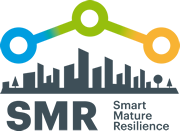Which sectors has your project focused on and why is resilience so important for these sectors? In our case, we have focused on cities. Our assumption was that if we would like Europe to be resilient, we needed a backbone of resilient cities. So, that’s the metaphor we have used. We would like to contribute to creating this backbone of European cities.
How can your European resilience management guidelines support resilience building in Europe? Our guideline and the five tools included in this guideline, contribute to the city resilience development process. In this process, there are many stakeholders involved, and we have defined a Maturity Model that goes through five stages. Each of the tools supports one cycle of these five stages. We have the Risk Systemicity Questionnaire, the Maturity Model, the Policies Tool, the City Resilience Dynamics tool, the Communication tool, and each of them are used in a cycle within this process going through the five maturity stages: Starting, Moderate, Advanced, Robust and Vertebrate.
Who can use the tools you have developed? Any stakeholder involved in this city resilience development process, starting from the local governments, and also including first responders, critical infrastructure operators, media, citizens: so any stakeholder involved in the city resilience development process.
What is different about your project compare to the other four DRS-7 projects? Our main contribution is including this perspective from the cities. Other projects have been more focused on critical infrastructure, which are of course very relevant to city resilience, but in our case, our unit of analysis – our focus – has been the city, which includes the critical infrastructure, but not the opposite. In some other cases, they have started from the critical infrastructure and then have gone to the local government.
What has been the most impactful outcome of your project? Listening to our users today, I would say that we have cooperated to break the silos among the departments in the cities. It is usual that cities have different departments: one related to climate change, another one related to mobility, another one related to social affairs. So during this project, we have created some cooperation opportunities among these departments, and I think that has been our main impact on them.
How did you contribute to the White Paper on Critical Infrastructure? Our contribution has been directed towards the inclusion of the city perspective. In addition to the perspective starting from critical infrastructure, we have added this perspective starting from cities, which I think is also very relevant.
Looking to the future, what are your thoughts on integrating the outcomes of the five projects? At this stage, we have many bricks that could be useful to build this resilient wall. Now, we know more about each other, we know more about the tools developed in other projects, so we have all the ingredients we need to create a good recipe. So, now we have to better understand how we can adapt the other projects’ developed tools into our guidelines. So, I am optimistic about the integration prospect.
Watch the video interview at https://youtu.be/laKVQJaJkVo.




